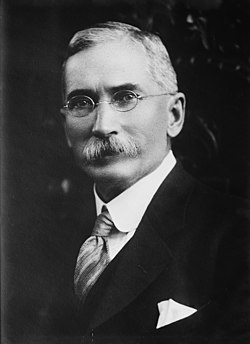James Barry Munnik Hertzog
|
The Right Honourable J. B. M. Hertzog KC |
|
|---|---|
 |
|
| 3rd Prime Minister of South Africa | |
|
In office 30 June 1924 – 5 September 1939 |
|
| Monarch |
George V Edward VIII George VI |
| Governor-General |
1st Earl of Athlone 6th Earl of Clarendon Sir Patrick Duncan |
| Preceded by | Jan Christiaan Smuts |
| Succeeded by | Jan Christiaan Smuts |
| Personal details | |
| Born |
James Barry Munnik Hertzog 3 April 1866 Wellington, Cape Colony |
| Died | 21 November 1942 (aged 76) Pretoria, Transvaal Province, Union of South Africa |
| Political party |
National Party United Party |
| Spouse(s) | Wilhelmina Neethling |
| Children | 3 |
| Alma mater | University of Amsterdam |
| Religion | Dutch Reformed |
General James Barry Munnik Hertzog KC, better known as Barry Hertzog or J. B. M. Hertzog (3 April 1866 – 21 November 1942), was a South African politician and soldier.
He was a Boer general during the second Anglo-Boer War who became Prime Minister of the Union of South Africa from 1924 to 1939. Throughout his life he encouraged the development of Afrikaner culture, determined to protect the Afrikaners from British influence. He is the only South African Prime Minister to have served under three British Monarchs (George V, Edward VIII, and George VI).
Hertzog first studied law at Victoria College in Stellenbosch, Cape Colony. In 1889 he went to the Netherlands to read law at the University of Amsterdam, where he prepared a dissertation on the strength of which he received his doctorate in law on 12 November 1892.
He had a law practice in Pretoria from 1892 until 1895, when he was appointed to the Orange Free State High Court. During the Boer War of 1899–1902 he rose to the rank of general, becoming the assistant chief commandant of the military forces of the Orange Free State. Despite some military reverses, he gained renown as a daring and resourceful leader of the guerilla forces continuing to fight the British. Eventually, convinced of the futility of further bloodshed, he signed the May 1902 Treaty of Vereeniging.
With South Africa now at peace, Hertzog entered politics as the chief organiser of the Orangia Unie Party. In 1907, the Orange River Colony gained self-government and Hertzog joined the cabinet as Attorney-General and Director of Education. His insistence that Dutch as well as English be taught in the schools met bitter opposition. He was appointed national Minister of Justice in the newly formed Union of South Africa. He continued in office until 1912. His antagonism to imperialism and to Premier Botha led to a ministerial crisis. In 1913 he led a secession of the Old Boer and anti-imperialist section from the South African Party.
...
Wikipedia
